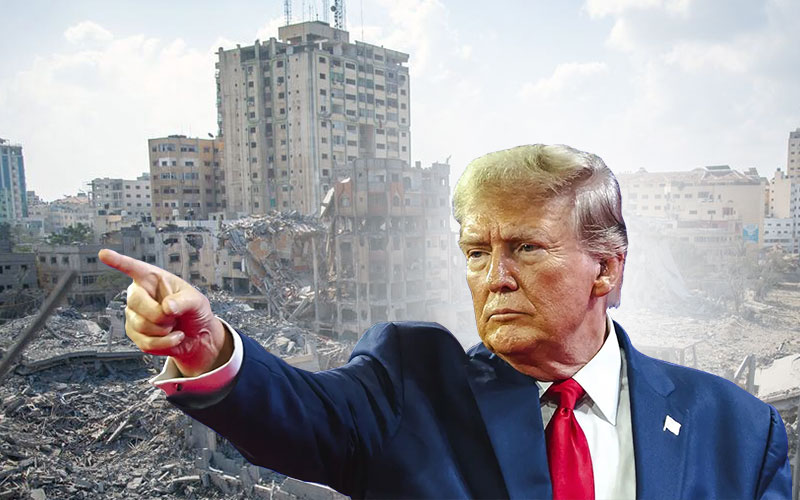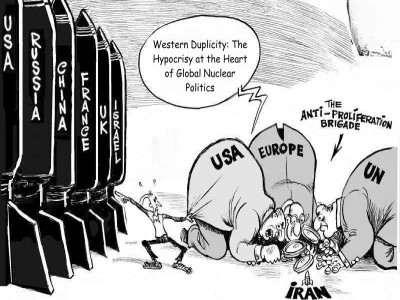
Trump's Gaza Plan - A Dangerous Overreach?
The idea presented by U.S. President Trump to take ownership of Gaza and redevelop it into a “Middle Eastern Riviera” is highly controversial and carries several critical implications. On one hand, the plan could be seen as an audacious attempt to address the long-standing challenges of Gaza, which has been devastated by years of conflict. The emphasis on transforming Gaza’s strategic waterfront into a hub of development could, in theory, provide opportunities for peace and stability in the region if managed effectively.
However, there are multiple problematic aspects of the proposal that warrant scrutiny. Firstly, the very notion of the U.S. "taking over" Gaza raises questions about sovereignty, as it disregards the complex political, social, and historical context of the Palestinian territory. Gaza is not simply a piece of real estate to be developed; it is home to millions of Palestinians with deep political aspirations, many of whom reject any foreign occupation or intervention. The proposal appears to sideline the role of the Palestinian people and leadership in deciding their future, which is a critical point in the peace process.
Additionally, the idea of relocating Palestinians, particularly without the consent of surrounding nations like Jordan and Egypt, could exacerbate regional tensions. These countries have already made it clear that they do not wish to accept Palestinian refugees, further complicating any relocation plan. The proposal also contradicts Trump’s previous stance against nation-building and foreign entanglements, presenting a significant shift in his policy stance that could cause confusion and create more friction in the region.
Furthermore, the logistics of rebuilding Gaza, given the sheer scale of destruction and the absence of basic infrastructure, would require immense financial resources, long-term commitment, and international cooperation. The involvement of U.S. troops in securing the territory, as hinted at in some reports, risks further military entanglement in a region where American forces have historically faced challenges.
While the plan could generate global attention and prompt other nations to come forward with solutions, it risks deepening the ongoing conflict by disregarding Palestinian sovereignty and regional sensitivities. Instead of focusing solely on physical redevelopment, a comprehensive peace process involving all stakeholders would be necessary to ensure lasting stability in Gaza and the broader Middle East.
President Trump's recent remarks on countries like Mexico, and Canada, and even his idea for the Gaza Strip echo the rhetoric of a medieval monarch or an imperialist ruler more than the approach one might expect from the leader of a democratic nation that champions the values of liberty and international cooperation. His comments about the Panama Canal, Greenland, and now Gaza appear to reflect a mindset focused on control and expansion as if the world were a chessboard where territories could be "owned" or "redeveloped" at the whim of the United States.
This kind of rhetoric, which places value on geopolitical acquisition and dominance, is concerning for several reasons. Firstly, it undermines the principles of self-determination and sovereignty that are fundamental to international law and relations. The suggestion that the U.S. should "take over" Gaza or that Greenland should be bought is reminiscent of colonial-era thinking, where powerful nations felt entitled to exert control over weaker ones for economic or strategic benefit.
Furthermore, these statements seem to disregard the modern, globalized world, where the ideals of diplomacy, mutual respect, and collective decision-making are prioritized. In contrast to the medieval king, who would see the world as his to conquer, a true leader in today’s world should be focused on fostering collaboration, peace, and coexistence. Rhetoric that implies domination rather than partnership can strain diplomatic relations, alienate allies, and create hostility on the global stage.
President Trump’s language also feeds into the growing trend of nationalism and populism, which often positions the interests of a single nation above the collective good of the international community. This can create an environment where countries are pitted against each other in pursuit of their agendas, undermining the cooperative spirit that has underpinned global progress for decades.
In essence, Trump’s comments about these regions not only betray an understanding of power dynamics but also a disregard for the values that the United States has historically championed—freedom, democracy, and the right of people to govern themselves. Such remarks are likely to deepen global divisions and set back the pursuit of peaceful solutions to the world’s most pressing issues. They are, in stark contrast, to his stance in a 2020 speech to West Point cadets, where he declared that the U.S. should focus on defending its vital interests and not involve its military in solving conflicts in distant lands.
A Volatile Situation: Global Powers React with Caution
The international response to Trump’s Gaza proposal is one of caution and concern. Two countries, in particular, will be watching the situation closely: China and India, both of whom have their strategic interests in the region.
China: With its growing influence in the Middle East and its emphasis on non-interference in the internal affairs of sovereign states, China is likely to view Trump’s plans as a destabilizing force. Beijing’s Belt and Road Initiative has seen significant investments in the region, and any U.S. military intervention in Gaza could be seen as an obstacle to China’s economic and political ambitions. Furthermore, China will likely use this opportunity to criticize U.S. unilateralism, positioning itself as a leader of diplomacy and peaceful resolution in contrast to Trump’s heavy-handed approach.
India: India’s position on Gaza is complex, as it has historically maintained strong relations with both Israel and several Arab nations. India advocates for a peaceful resolution to the Israeli-Palestinian conflict, but Trump’s suggestion of U.S. control over Gaza could put India in a precarious position. While India may have shared security concerns with the U.S. in the past, Trump’s push for military intervention in Gaza could alienate India, a key partner in Asia. India is also wary of any U.S. intervention that could disrupt the delicate balance in the Middle East, potentially undermining its regional interests.
A Dangerous Precedent: The Risks of Trump’s Proposal
Trump’s latest proposal is a dangerous precedent that highlights his penchant for bold actions without fully understanding the implications. His lack of diplomatic acumen and disregard for international alliances have already resulted in the erosion of U.S. influence worldwide. By pushing for military intervention in Gaza, Trump risks further entangling the U.S. in a conflict that offers no clear solution. Rather than seeking peace and stability, his approach seems to prioritize making an immediate impact, regardless of the long-term consequences.
The volatility of the Middle East and the complexity of the Gaza situation demand a nuanced and multilateral approach, not a rash, unilateral decision driven by the desire for instant results. Trump’s actions are likely to deepen existing conflicts, alienate key allies, and undermine U.S. credibility in the region. As the situation unfolds, the world will be left to grapple with the consequences of another ill-conceived foreign policy decision from a leader who often failed to recognize the broader implications of his actions.
Russia’s Isolation: The Price of Aggression
On the other side, Russia’s inability to swiftly achieve its objectives in Ukraine has led to deepening isolation on the world stage. Sanctions and international condemnation have pushed Russia into the arms of a few allies like China and Iran, while its diplomatic efforts to break the deadlock have largely been ignored. The war has exposed the limits of Russia’s geopolitical power and influence, as its actions have not only resulted in failure on the battlefield but have also caused the collapse of its standing with Europe and the West.
Russia’s attempts to exert influence over global events, such as its role in Syria or the Iran nuclear deal or for that matter on Gaza or Trump, have become increasingly impotent as the war in Ukraine rages on. While Russia still holds significant military power, it is increasingly seen as a pariah state, unable to move the needle on issues outside of its immediate sphere of interest. Its strategic position in Europe is rapidly diminishing, and with the West strengthening alliances, particularly through NATO and support for Ukraine, Russia’s capacity to assert its opinion on major geopolitical matters has been severely curtailed.
The inability of both Europe and Russia to bring about an end to the Russia-Ukraine war reflects a broader trend of global fragmentation. While the U.S. has taken the lead in driving the narrative on Ukraine, Europe, and Russia have found themselves sidelined, unable to effectively influence the course of the conflict or global discussions on other key issues.
Capitalizing on Global Confusion
The world’s attention is understandably consumed by the Russia-Ukraine war, the challenges posed by China's assertive actions, and the instability in the Middle East. Against this backdrop, Trump has begun to voice opinions and make promises that serve his political interests rather than addressing the broader issues at play. His public commentary on withdrawing from NATO, or his dismissive remarks about the importance of international alliances, reflects a dangerously simplistic approach to global politics. Rather than seeking to stabilize the international order, Trump is instead exploiting the disorder to push his isolationist, self-centered agenda.
Where others see the need for cooperative diplomacy, Trump appears focused on what he can extract from international relations, often with little regard for the long-term implications. His approach to global issues, including his previous disinterest in forging strong alliances or addressing the importance of multilateral engagement, reveals a desire for short-term gains rather than sustainable solutions.
Childish Wishes for Power and Recognition
What is perhaps most striking about Trump’s behavior amid this global disorder is the way he seems to treat complex geopolitical issues as a playground for his own ego. His suggestions and decisions often seem detached from any strategic framework, relying instead on populist rhetoric that resonates with his base but alienates allies. Trump’s fixation on undermining NATO, dismissing established agreements, or encouraging conflict for personal gain reflects a pattern of “childish wishes” driven by a need for recognition and power—at the expense of the global community’s stability.
This “playground mentality” has been detrimental not only to the U.S.’s credibility but also to the international community as a whole. From his erratic trade wars to his inconsistent foreign policy approach, Trump’s desire for immediate recognition often clashes with international diplomacy's broader, more strategic needs.
The Road to Global Chaos
The world’s inability to break free from global entanglements is largely due to leaders like Trump and Putin who, in their quest for personal gain and recognition, undermine the collective interests of the international community. Their reckless actions threaten the delicate balance that keeps global conflicts in check. As tensions continue to rise, the road to a more stable, cooperative world seems increasingly uncertain, and the voices of those seeking to restore peace and diplomacy grow fainter amid the chaos.
Disclaimer: The opinions expressed in this article are those of the author's. They do not purport to reflect the opinions or views of The Critical Script or its editor.

Newsletter!!!
Subscribe to our weekly Newsletter and stay tuned.

















Related Comments